Solution Architects play a critical role in bridging the gap between complex business problems and solutions in technology. They design the framework of systems to ensure they meet both technical and business needs.
Key skills for a Solution Architect include a deep understanding of software architecture and design, proficiency in various programming languages, and strong project management abilities.
Candidates can write these abilities in their resumes, but you can’t verify them without on-the-job Solution Architect skill tests.
In this post, we will explore 8 essential Solution Architect skills, 9 secondary skills and how to assess them so you can make informed hiring decisions.
Table of contents
8 fundamental Solution Architect skills and traits
The best skills for Solution Architects include Technical Proficiency, System Integration, Architectural Knowledge, Business Acumen, Project Management, Stakeholder Communication, Security Principles and Cloud Solutions.
Let’s dive into the details by examining the 8 essential skills of a Solution Architect.
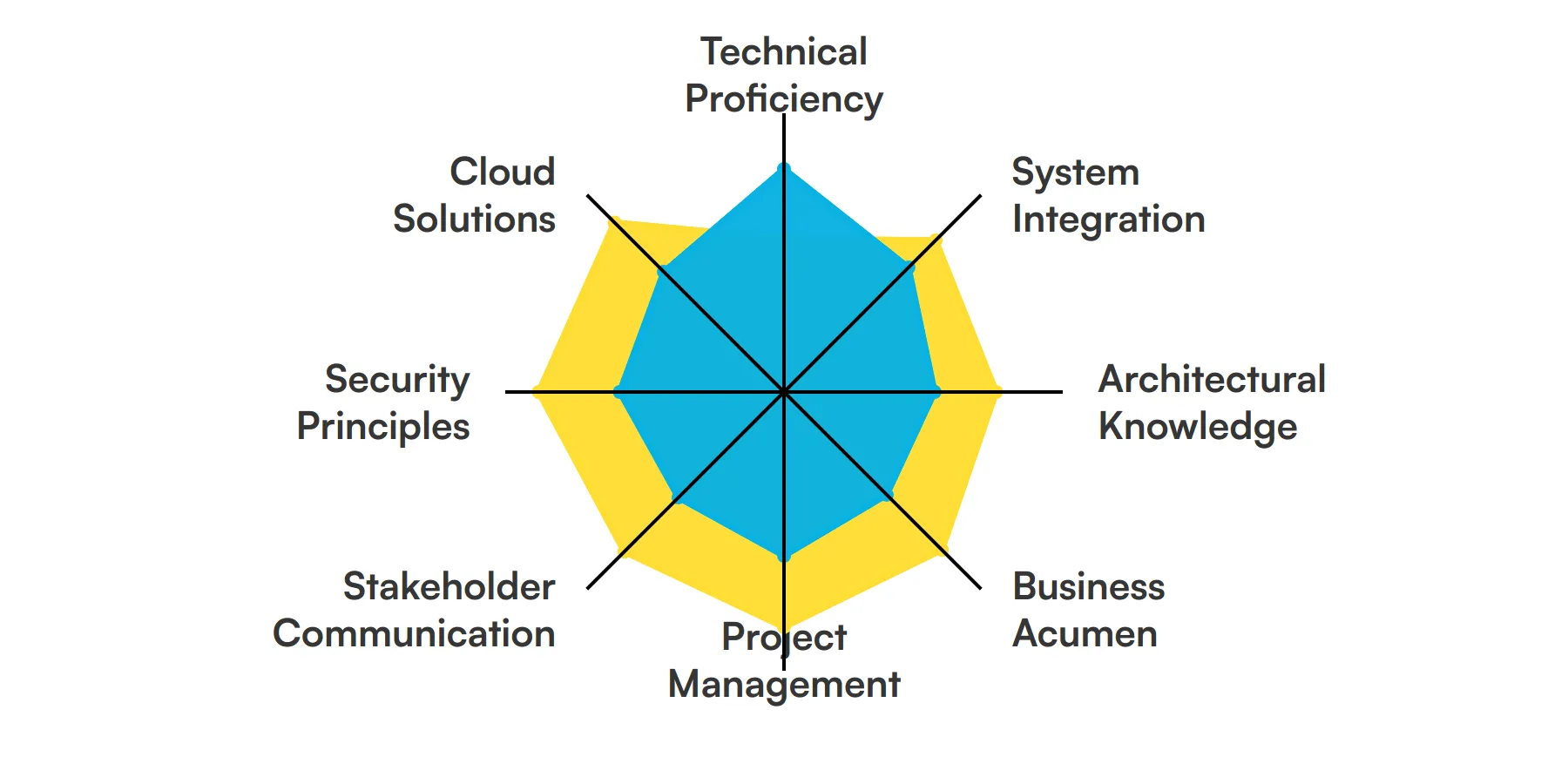
Technical Proficiency
A Solution Architect must have a deep understanding of various software and hardware systems. This skill is crucial for designing solutions that are both innovative and feasible within the technical constraints of the organization.
Check out our guide for a comprehensive list of interview questions.
System Integration
Integrating disparate systems and technologies is a core responsibility for a Solution Architect. They need to ensure that these integrations are seamless and efficient, enhancing system functionality while maintaining data integrity.
Architectural Knowledge
Understanding different architectural frameworks and models is essential for a Solution Architect. This knowledge helps them to design systems that are scalable, reliable, and secure.
For more insights, check out our guide to writing a Software Architect Job Description.
Business Acumen
A Solution Architect must grasp the business implications of technical decisions. They align system designs with business goals, ensuring that IT strategies and business strategies are in sync.
Project Management
Managing timelines, resources, and project scopes effectively is vital for a Solution Architect. They oversee the project lifecycle to ensure that the architectural solutions are delivered on time and meet all specifications.
Stakeholder Communication
Effective communication with stakeholders is key for a Solution Architect. They must be able to translate technical details into business language to ensure alignment and buy-in from all parties involved.
Security Principles
A Solution Architect must incorporate robust security measures into system designs. This involves understanding potential threats and ensuring that all aspects of the architecture are secure against vulnerabilities.
Check out our guide for a comprehensive list of interview questions.
Cloud Solutions
With the rise of cloud computing, a Solution Architect should be proficient in designing and deploying solutions in the cloud. This includes selecting appropriate cloud services and managing cloud infrastructure.
9 secondary Solution Architect skills and traits
The best skills for Solution Architects include Data Modeling, Performance Tuning, Compliance Knowledge, User Experience, Change Management, Technical Documentation, Vendor Management, Prototyping and Continuous Learning.
Let’s dive into the details by examining the 9 secondary skills of a Solution Architect.
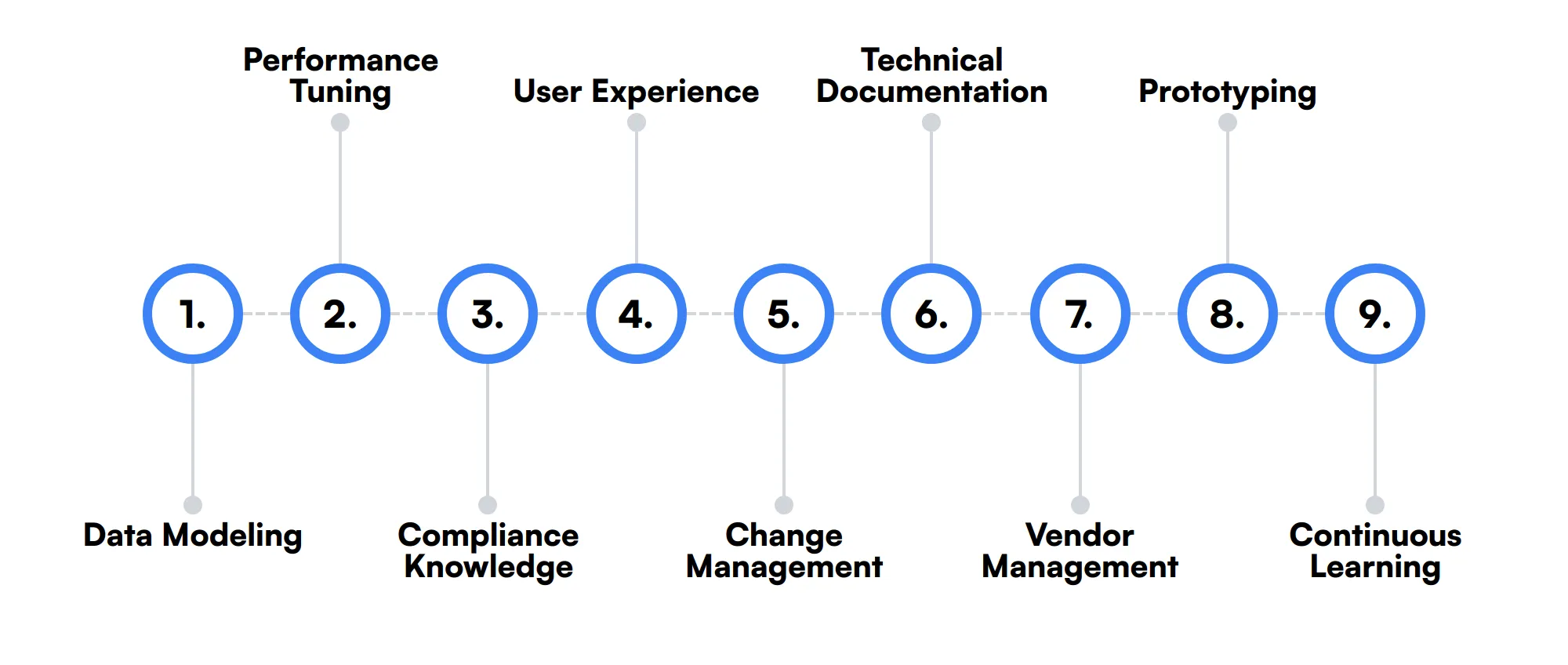
Data Modeling
Understanding and designing efficient data models is important for a Solution Architect to ensure that databases are optimized and support the needs of the business applications.
Performance Tuning
The ability to optimize system performance through various techniques is a valuable skill for a Solution Architect, ensuring that the solutions meet the required speed and efficiency standards.
Compliance Knowledge
A Solution Architect should be aware of relevant compliance and regulatory requirements to ensure that the systems adhere to legal and ethical standards.
User Experience
Designing systems with a focus on user experience ensures that the end product is not only functional but also user-friendly, which is crucial for user adoption and satisfaction.
Change Management
The ability to manage and adapt to technological changes is important for a Solution Architect, as it helps in updating systems efficiently and with minimal disruption.
Technical Documentation
Creating clear and comprehensive technical documentation is essential for maintaining system integrity and facilitating future upgrades or troubleshooting.
Vendor Management
Skills in managing vendor relationships are important for a Solution Architect when integrating third-party solutions or outsourcing parts of the infrastructure.
Prototyping
Developing prototypes can help a Solution Architect validate ideas and designs early in the project lifecycle, reducing risks associated with new or complex integrations.
Continuous Learning
Technology evolves rapidly, and a Solution Architect must stay updated with the latest trends and technologies to design cutting-edge solutions.
How to assess Solution Architect skills and traits
Assessing the skills and traits of a Solution Architect can be a challenging task, given the diverse range of competencies required for the role. From technical proficiency and system integration to business acumen and stakeholder communication, a Solution Architect must wear many hats. It's not just about knowing the right technologies; it's about understanding how to integrate them into a cohesive system that meets business needs while ensuring security and scalability.
Traditional resumes and interviews often fall short in providing a comprehensive view of a candidate's abilities. This is where skills-based assessments come into play. By leveraging tools like Adaface assessments, you can gain a clearer picture of a candidate's competencies, leading to a 2x improved quality of hires. These assessments can help you evaluate key skills such as architectural knowledge, project management, and cloud solutions, ensuring that you find the right fit for your organization.
Let’s look at how to assess Solution Architect skills with these 6 talent assessments.
Technical Aptitude Test
Technical Aptitude Test evaluates a candidate's general technical knowledge and problem-solving skills across a broad range of topics including programming fundamentals, data structures, and system administration.
The test challenges candidates with scenario-based multiple-choice questions that cover basic computer concepts, database management, networking, and security, requiring the application of critical thinking and analytical skills.
Successful candidates demonstrate a strong ability to apply logical reasoning and technical aptitude in solving complex technical problems.
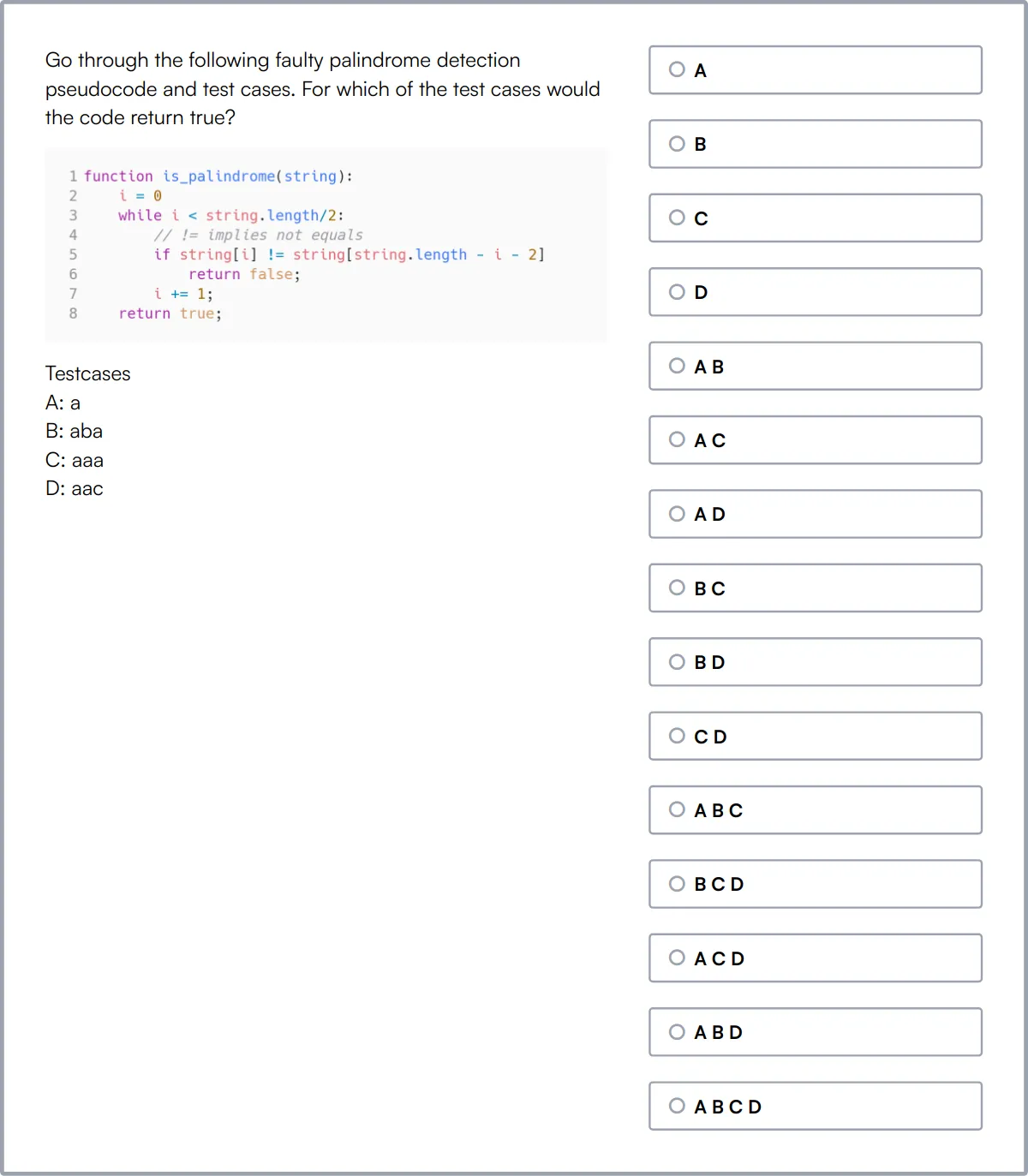
System Design Online Test
System Design Online Test assesses proficiency in designing software systems that meet both functional and non-functional requirements, focusing on system architecture and design patterns.
Candidates are evaluated on their ability to create high-level design specifications, with a focus on database design, data modeling, system integration, security, and performance optimization.
The test includes questions that gauge a candidate's proficiency in identifying system requirements and choosing appropriate architectures, ensuring they can handle complex design challenges.
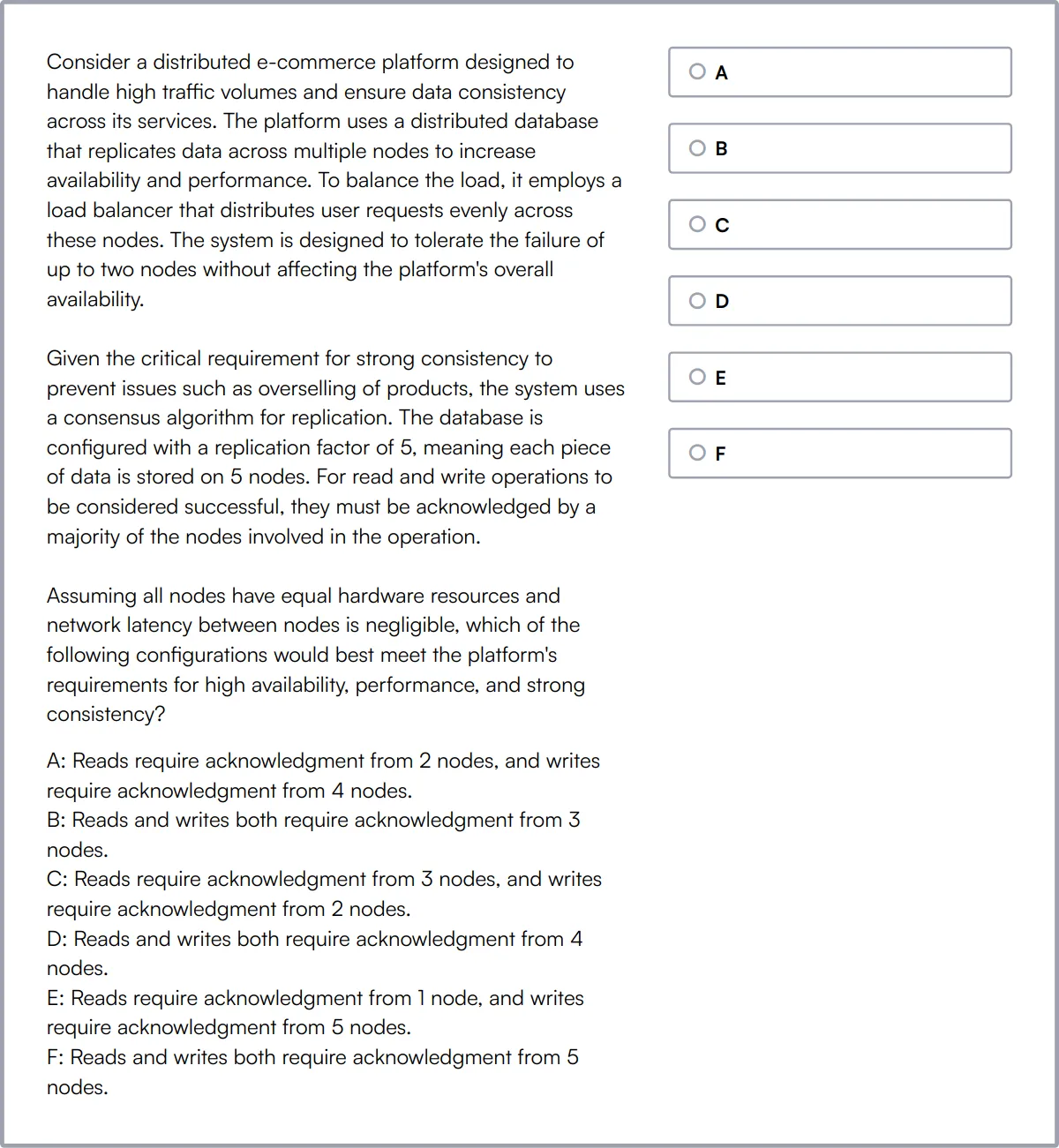
Software Engineering Online Test
Software Engineering Online Test evaluates candidates on core computer science concepts such as object-oriented programming, database design, and algorithms.
This test includes scenario-based MCQs and a coding question to assess problem-solving and hands-on programming abilities, focusing on testing and quality assurance, web development, and software security.
High-scoring candidates demonstrate a strong grasp of software engineering principles and the ability to apply these principles in practical coding scenarios.
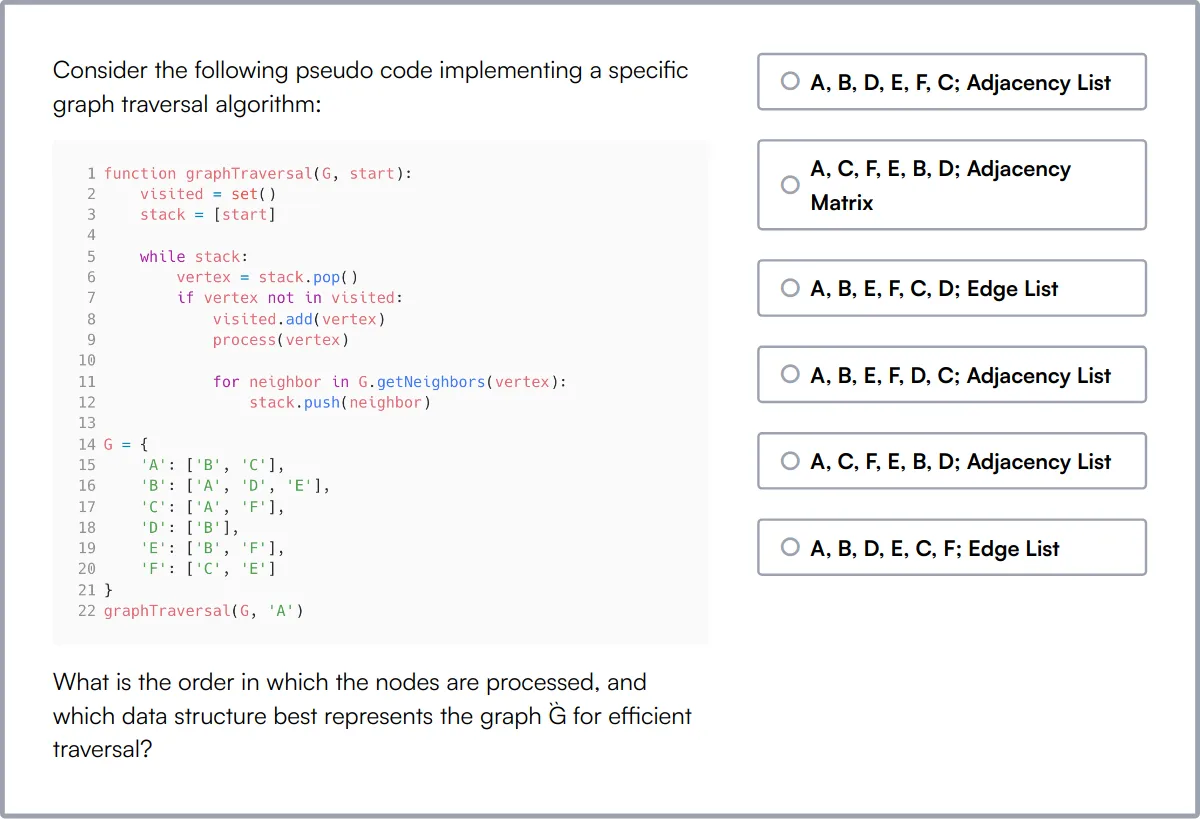
Business Analyst Test
Business Analyst Test evaluates a candidate's ability to define business problems, gather and analyze requirements, and develop effective communication with stakeholders.
The test assesses critical thinking, problem-solving, data analysis, and project management skills through scenario-based MCQs covering SQL fundamentals, data interpretation, and business analysis.
Candidates who perform well on this test are adept at creating process models, developing use cases, and effectively communicating complex data to non-technical stakeholders.

Project Management Test
Project Management Test assesses a candidate's ability to plan and execute projects efficiently, from conception through implementation.
The test evaluates skills in risk analysis, budget allocation, stakeholder management, and the use of agile and traditional project management methodologies.
Successful candidates will demonstrate proficiency in mapping project timelines, managing resources, and handling changes and issues throughout the project lifecycle.
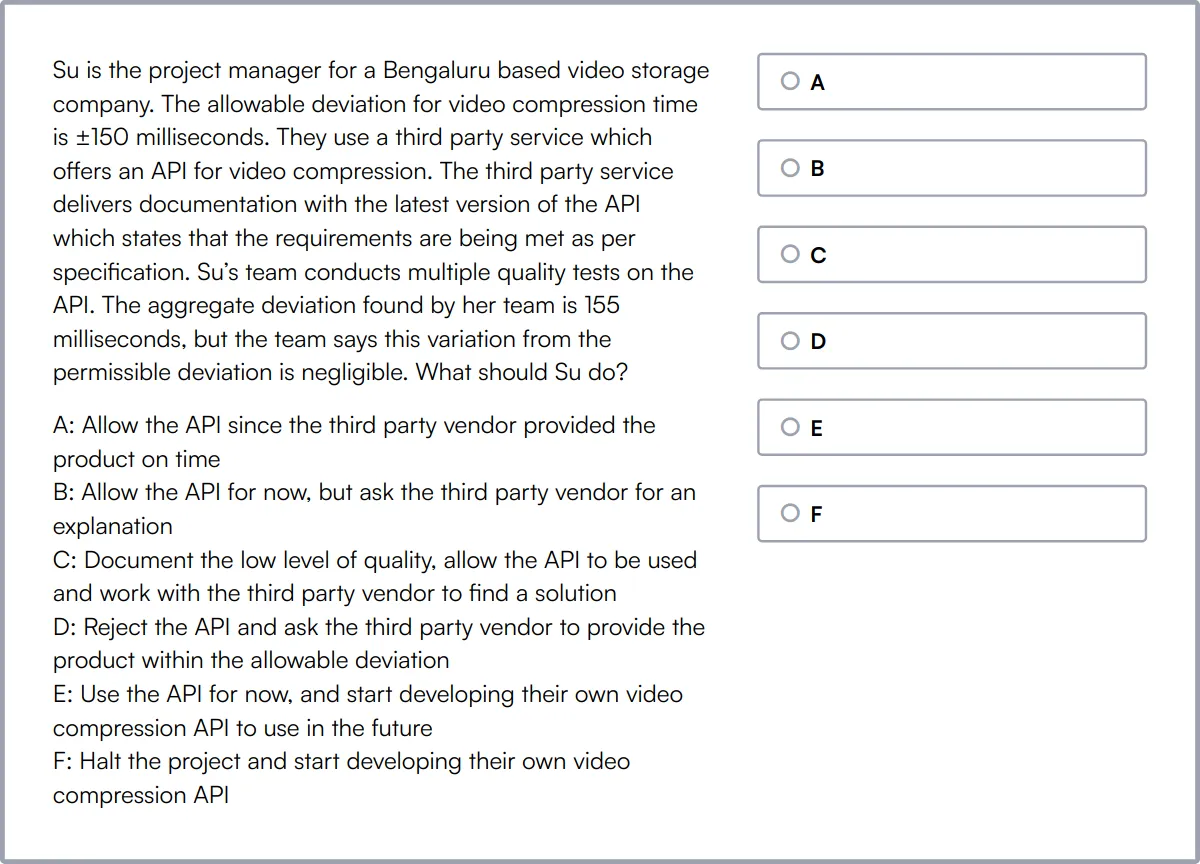
Communication Skills Test
Communication Skills Test evaluates candidates on their ability to communicate effectively in various professional scenarios, focusing on both verbal and written communication skills.
The test includes situational judgement MCQs, assessing candidates' critical thinking, attention to detail, and verbal reasoning.
Candidates excelling in this test are capable of engaging effectively with customers, colleagues, and stakeholders, ensuring clear and effective communication across all interactions.
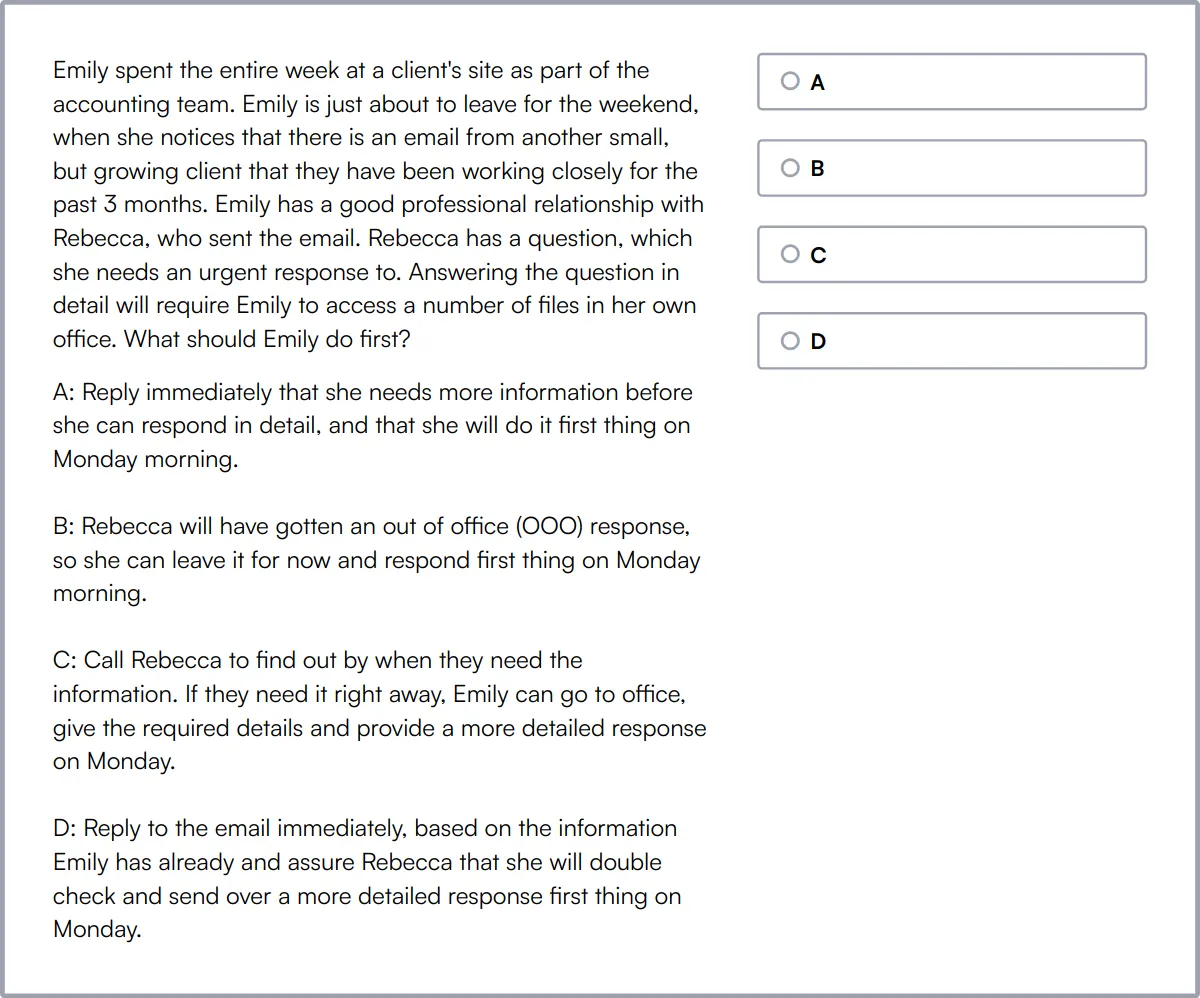
Summary: The 8 key Solution Architect skills and how to test for them
| Solution Architect skill | How to assess them |
|---|---|
| 1. Technical Proficiency | Evaluate the depth of knowledge in relevant technologies and tools. |
| 2. System Integration | Assess the ability to connect and unify disparate systems. |
| 3. Architectural Knowledge | Check understanding of architectural patterns and best practices. |
| 4. Business Acumen | Gauge the ability to align technical solutions with business goals. |
| 5. Project Management | Determine skills in planning, executing, and closing projects. |
| 6. Stakeholder Communication | Evaluate effectiveness in conveying technical concepts to non-technical stakeholders. |
| 7. Security Principles | Assess knowledge of security protocols and risk management. |
| 8. Cloud Solutions | Check proficiency in designing and deploying cloud-based architectures. |
AWS Online Assessment Test
Solution Architect skills FAQs
What technical skills should a Solution Architect possess?
A Solution Architect should have expertise in programming languages, cloud platforms, and system integration. Familiarity with databases, networking, and security principles is also important.
How can I assess a candidate's system integration skills?
Evaluate their experience with APIs, middleware, and integration tools. Ask for examples of past projects where they successfully integrated multiple systems.
Why is business acumen important for a Solution Architect?
Business acumen helps Solution Architects align technical solutions with business goals. It ensures that the architecture supports the company's strategic objectives.
What methods can be used to evaluate a candidate's project management skills?
Look for certifications like PMP or PRINCE2. Ask about their experience managing projects, including timelines, budgets, and team coordination.
How do you test a Solution Architect's knowledge of security principles?
Discuss their understanding of security frameworks, encryption, and compliance standards. Review their experience with implementing security measures in past projects.
What is the importance of stakeholder communication in a Solution Architect role?
Effective communication ensures that all stakeholders understand the architecture and its benefits. It helps in gaining buy-in and addressing concerns early in the project.
How can continuous learning be assessed in a Solution Architect?
Ask about recent courses, certifications, or conferences they have attended. Inquire about their methods for staying updated with industry trends and technologies.
What role does user experience play in solution architecture?
User experience ensures that the solutions are user-friendly and meet end-user needs. It involves designing intuitive interfaces and seamless interactions.

40 min skill tests.
No trick questions.
Accurate shortlisting.
We make it easy for you to find the best candidates in your pipeline with a 40 min skills test.
Try for freeRelated posts
Free resources



